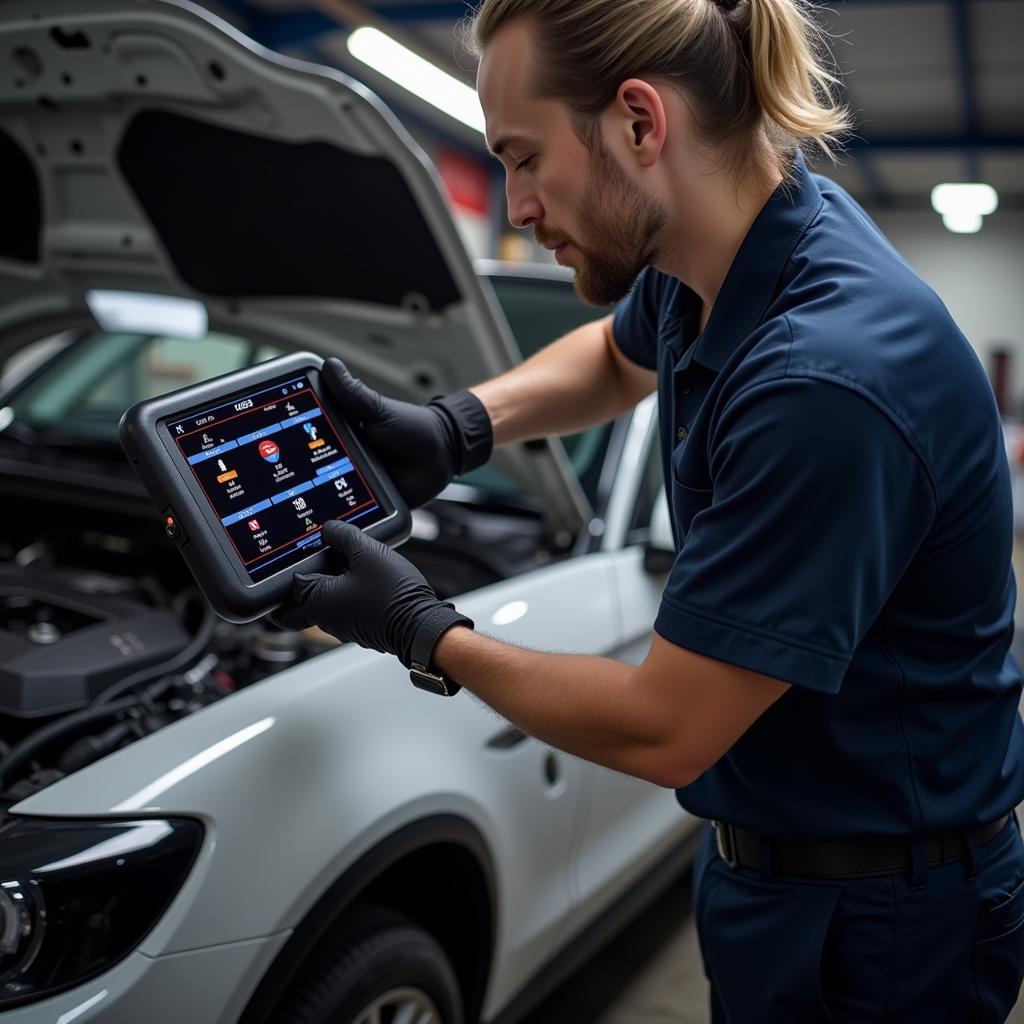A full diagnostic on a car, also known as a comprehensive car diagnostic, is an in-depth analysis of your vehicle’s electronic systems using advanced diagnostic tools and software. Unlike a basic code scan that simply identifies existing error codes, a full diagnostic aims to pinpoint the root cause of issues affecting your car’s performance, drivability, and overall health.
 Mechanic performing a full car diagnostic
Mechanic performing a full car diagnostic
Why is a Full Car Diagnostic Important?
Modern vehicles are equipped with complex electronic systems that control everything from engine performance and transmission shifting to safety features and comfort amenities. When a problem arises, a full car diagnostic acts like a detective, meticulously examining these systems to:
- Uncover Hidden Problems: Often, car issues present with vague symptoms or warning lights. A full diagnostic delves deeper to reveal underlying problems that might go unnoticed during a routine inspection.
- Prevent Costly Repairs: By identifying issues early on, a full diagnostic can help you address minor problems before they escalate into major (and expensive) repairs down the line.
- Improve Vehicle Performance: From engine misfires and rough idling to transmission problems and reduced fuel efficiency, a full diagnostic can pinpoint and resolve issues hindering your car’s optimal performance.
What Does a Full Diagnostic on a Car Check?
A full car diagnostic typically covers a wide range of electronic systems, including:
- Engine Control Module (ECM): Monitors and controls various engine functions, including fuel injection, ignition timing, and emissions.
- Transmission Control Module (TCM): Manages gear shifting, torque converter lockup, and other transmission-related functions.
- Anti-lock Braking System (ABS): Ensures optimal braking performance by preventing wheel lockup.
- Electronic Stability Control (ESC): Helps maintain vehicle stability during cornering and slippery conditions.
- Airbag Control Module (ACM): Controls the deployment of airbags in the event of a collision.
- Body Control Module (BCM): Manages various body-related functions such as power windows, central locking, and lighting.
“A full diagnostic goes beyond just reading error codes,” says automotive expert John Miller. “It’s about understanding the communication between different systems and identifying the root cause of the problem, not just the symptom.”
How Long Does a Full Car Diagnostic Take?
The duration of a full diagnostic can vary depending on the complexity of the issue and the specific make and model of your car. However, you can generally expect it to take anywhere from 30 minutes to a couple of hours.
For more detailed information on the duration, you can refer to our dedicated article: how long does a full car diagnostic take.
How Much Does a Full Car Diagnostic Cost?
The cost of a full car diagnostic can range from a nominal fee to a couple of hundred dollars, depending on several factors such as:
- Location: Labor rates can differ significantly depending on your geographical location.
- Service Provider: Independent garages or specialized diagnostic centers may offer more competitive rates compared to dealerships.
- Complexity of the Issue: Diagnosing complex issues that require specialized equipment or extensive troubleshooting may incur higher costs.
To learn more about the cost of a full diagnostic, check out our comprehensive guide: how much is a full car diagnostic.
Where Can I Get a Full Diagnostic on My Car?
When choosing where to get a full car diagnostic, consider the following options:
- Dealerships: While generally more expensive, dealerships have access to manufacturer-specific diagnostic tools and expertise.
- Independent Garages: Many reputable independent garages invest in advanced diagnostic equipment and employ skilled technicians.
- Specialized Diagnostic Centers: These centers focus specifically on automotive diagnostics and often possess cutting-edge tools and expertise.
We’ve put together a helpful resource to assist you in finding the right place for a full diagnostic: where to get full diagnostic on my car.
Is a Full Car Diagnostic Worth It?
Given the increasing complexity of modern vehicles and the potential cost savings associated with early problem detection, investing in a full car diagnostic is a wise decision, especially if:
- Your car is exhibiting unusual symptoms or warning lights are illuminated.
- You’re experiencing performance issues such as reduced fuel efficiency or rough idling.
- You’re considering buying a used car and want a comprehensive assessment of its condition.
“Think of a full diagnostic as preventative maintenance,” advises automotive expert Sarah Thompson. “It’s an investment in the longevity and reliability of your vehicle.”
Conclusion
A full car diagnostic provides a deep dive into your vehicle’s electronic systems, offering a comprehensive understanding of its health and identifying potential issues before they escalate. By investing in a full diagnostic, you’re taking a proactive approach to car maintenance, potentially saving yourself from costly repairs and ensuring a smoother, safer driving experience.
For further insights into the cost aspects of a full car diagnostic, you can explore our dedicated page: how much does a full car diagnostic cost.

Leave a Reply